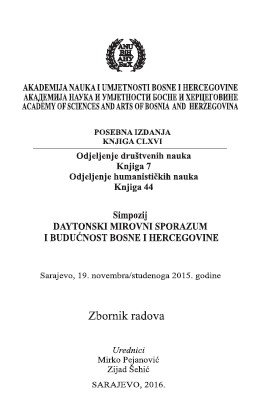MULTIKULTURALIZMOM PROTIV PLURALIZMA – SLUČAJ DEJTONSKE BOSNE I HERCEGOVINE
MULTICULTURALISM VERSUS PLURALISM – CASE OF THE DAYTON BIH
Author(s): Asim Mujkić
Subject(s): Constitutional Law, Transformation Period (1990 - 2010), Present Times (2010 - today), Inter-Ethnic Relations, Politics and Identity
Published by: Akademija Nauka i Umjetnosti Bosne i Hercegovine
Keywords: multiculturalism; ethno-nationalism; hegemony;
Summary/Abstract: The result of the process of Europeanization of the Balkans is a continuous loss of plurality of life forms, which flowed with the emergence of monoethnic nation states. Entering the modernity in the Balkans – in late nineteenth and early twentieth century – meant the resolution of social plurality. This process, when it comes to Bosnia and Herzegovina, which had no unequivocal ethnic host, has taken the form of constitutionally and politically imposed multiculturalism or constitutional multiculturalism, which is nothing more than an incubator for future mono-ethnic nation-states. In its fullest sense, apart from one state and a central nation, ethno-nationalism also requires its own, unique culture. In this sense, Gellner concludes that “under certain circumstances the implementation of these political formulas must include the exchange of population or expulsion, and more or less forced assimilation, and sometimes even liquidation, in order to achieve the close connection between the state and the culture that is the essence of nationalism.” The revolutionary national-statehood reconstruction of the plural Bosnian-Herzegovinian social and political community followed the form of a nation-state, as an inseparable part of the wave of democratization that had swept the eastern part of Europe. In considering alternatives to overcome this situation, the author suggests that the abolition of the ethno-political mechanism does not mean the abolition of the nation and its identity, it does not mean “the destruction of differences as such as the equalization of all. Conversely, it initiates the release and proliferation of differences – differences that do not create social hierarchies”. This is therefore a critique of the unjust socio-political hierarchy, a kind of political hegemony, and is not about the fight for the abolition of any kind of diversity, including ethnic. The aim is to abolish laws, socio-political structures that maintain hegemonic privileges, and the hierarchy topped by a class of ethno-political entrepreneurs. The author argues that the abolition of ethno-political mechanisms means the abolishment of the conditions that keep the citizens and peoples of Bosnia and Herzegovina in servitude.
Book: DAYTONSKI MIROVNI SPORAZUM I BUDUĆNOST BOSNE I HERCEGOVINE
- Page Range: 185-192
- Page Count: 8
- Publication Year: 2015
- Language: Bosnian, Croatian, Serbian
- Content File-PDF

